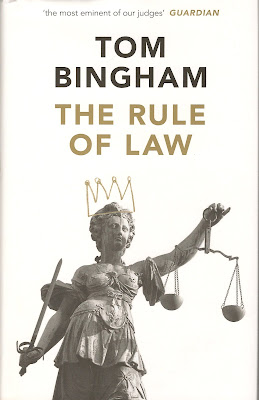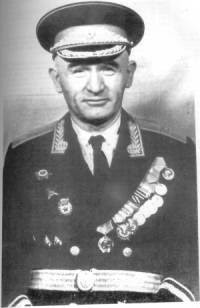 The Rule of Law is a very readable little book by Baron Bingham of Cornhill, who was Master of the Rolls, Lord Chief Justice of England and Wales and Senior Law Lord of the United Kingdom.
The Rule of Law is a very readable little book by Baron Bingham of Cornhill, who was Master of the Rolls, Lord Chief Justice of England and Wales and Senior Law Lord of the United Kingdom.The cover of the book is quite sexy and also provocative in other ways. I like the crown drawn on the head of statue of Justice in gold colour. It makes me think of The Rule of Law as a bit of a joke and also as a very serious comment on injustice all of us have experienced.
Baron Bingham writes well and I appreciated his historical introduction to the concept of the rule of the law. The passages on Magna Carta show passion as Baron Bingham writes that Chapters 39 and 40 of Magna Carta have the power to make the blood race:
39. No free man shall be seized or imprisoned or stripped of his rights or possessions, or outlawed or exiled, or deprived of his standing in any other way, nor will we proceed with force against him, or send others to do so, except by the lawful judgment of his equals or by the law of the land.
40. To no one will we sell, to no one deny or delay right or justice.
Baron Bingham really appears to have the point that this should be inscribed on the stationary of Ministry of Justice and the Home Office until one considers such things as the fact that now people travel freely and there has to be some limit as to who can seek justice and for what in UK.
Now, what about wars and the fact that UK is always at war somewhere? Baron Bingham states that war in Iraq is illegal and gives his reasons as to why this is the case. This issue is of interest to many people.
When I enrolled for a course in politics with a great title "Power and Dissent" I learned that, in fact, a country could wage a war for economical reasons only and that this is legal, but the exact circumstances were not outlined during my course. I guess the assumption is: only legally so... Everybody knows that Iraq has plenty of oil, but not many people know that having adequate oil supply is what determines the outcome of other wars as fuel is required for vehicles, tanks, airplanes etc. The fact that one country alone has been involved in at least 40 military actions in 25 years all over the world says something of its need for fuel and the need to control the supply in order to maintain its power. It is believed that one of the reasons why the Second World War was won is because Russians had their oil supply and Germans lacked sufficient supplies. Those who know the history of the oil wars would also know that many English people did die trying to get Russian oil too, in the past. This is not in Baron Bingham's book, of course. Today, the relationships are different between superpowers.
It is thought that English people originate from Saxons. The word Saxons originates from word sac which means quarrel. During old Persian Empire Saxons were regarded as lawless and quarrelsome lot. In Azerbaijan there is even a town called Sac. It is thought by some that this is where Saxons lived before their migration to Europe. The origin of world Saxon is not discussed in the book by Baron Bingham and I do not say writer should have done it. However, it is fascinating to me that people who have been regarded as lawless and quarrelsome for thousands of years have also been very successful materially, at least. It seems to show that one can get away with murders on a largish scale. Eventually, one remembers that law can be used occasionally when it suits, I guess.
There are many things one can learn from this book and I would recommend it, of course.
One also learns from things not in the book as the reader can choose to examine oneself or remember own experiences of seeking justice. I did this in a number of areas. The most obvious is that as a doctor I always did what was in the best interests of my patients and public. When as a whistleblower I became the target of reprisals and humiliations (and medical regulator gladly took part in it), I went to the courts for protection in the most honest belief that there was such a thing as the rule of law. I did not find it and neither did many others, as it is mob (in the case of medical whistleblowers) that wins in England. Today, mob does not throw stones or sticks or rotten garbage at the accused. They have courts to protect them and to kill the target for them with false allegations, nicely coordinated for the purpose of cover ups of e.g. medical errors or their own selfishness or politics of the day.
There is no Rule of Law in UK today, as far as I can see from my own experiences and efforts to get justice for about 11 years now. The High Court is servile to The General Medical Council (GMC), for example, and its own prejudices. It rubber stamps GMC decisions because that is the easiest thing to do and maybe, it is good for judges' career to please political masters of the day rather than comply with law. The Royal Courts of Justice allow Human Rights abuses to go on for many years and so does medical profession, their defence bodies and union. Everybody is so thoroughly institutionalised that one is tempted to come to the wrong conclusion that there are no intelligent people left in UK. The Royal Courts of Justice are also sexist, racist and religiously biased just like medical regulators. We know that and they know that we know that. The Royal Courts of Justice are forced to function in outdated buildings with outdated procedures matching the outdated attitudes. Did I miss reading about that in Baron Bingham's book?
The Rule of Law is very readable book and the issues are well presented and I would recommend you buy it. You may wish to read it again. It is the most readable law book I read so far. You will enjoy some of his recommendations for changes and smile wryly (as he does on the back cover) at his comment that European Court of Human Rights has many cases: "The most pressing problem now, however, is not whether the scope of the Convention should be enlarged but whether the Strasbourg court can handle the huge volume of cases currently brought before it". Well, a good measure of punishment could make courts function better. Should the judges be fined too when they mess up big time with attitudinal problems in full knowledge of the law and facts? If doctors are responsible for mistakes they make and have to compensate their victims why not judges?
